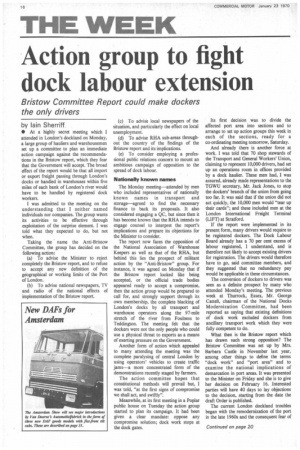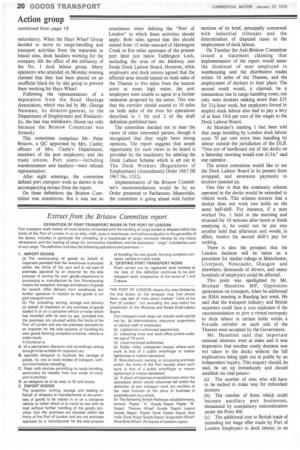Action group to fight dock labour extension
Page 18

Page 22

Page 23

If you've noticed an error in this article please click here to report it so we can fix it.
Bristow Committee Report could make dockers the only drivers
by lain Sherriff,
• At a highly secret meeting which I attended in London's dockland on Monday, a large group of hauliers and warehousemen set up a committee to plan an immediate action campaign against the recommendations in the Bristow report, which they fear that the Government will accept. The broad effect of the report would be that all import or export freight passing through London's docks or handled in warehouses within five miles of each bank of London's river would have to be handled by registered dock workers.
1 was admitted to the meeting on the understanding that I neither named individuals nor companies. The group wants its activities to be effective through exploitation of the surprise element. I was told what they expected to do, but not when.
Taking the name the Anti-Bristow Committee, the group has decided on the following action: (a) To advise the Minister to reject completely the Bristow report, and to refuse to accept any new definition of the geographical or working limits of the Port of London.
(b) To advise national newspapers, TV and radio of the national effects of implementation of the Bristow report. (c) To advise local newspapers of the situation, and particularly the effect on local unemployment.
(d) To advise RHA sub-areas throughout the country of the findings of the Bristow report and its implications.
(e) To consider employing a professional public relations concern to mount an ambitious campaign of opposition to the spread of dock labour.
Nationally known names The Monday meeting—attended by men who included representatives of nationally known names in transport and storage—agreed to find the necessary finance to back its proposals. it also considered engaging a QC, but since then it has become known that the RHA intends to engage counsel to interpret the report's implications and prepare its objections for the Minister to consider.
The report now faces the opposition of the National Association of Warehouse Keepers as well as that of the RHA, but behind this lies the prospect of militant action by the "Anti-Bristow" group. For instance, it was agreed on Monday that if the Bristow report looked like being accepted, or the official trade bodies appeared ready to accept a compromise, then the action group would be prepared to call for, and strongly support through its own membership, the complete blacking of London's docks by all transport and warehouse operators along the 97-mile stretch of the river from Foulness to Teddington. The meeting felt that the dockers were not the only people who could use a physical threat to exports as a means of exerting pressure on the Government.
Another form of action which appealed to many attending the meeting was the complete paralysing of central London by using operators' vehicles to create traffic jams—a more concentrated form of the demonstrations recently staged by farmers.
The action committee hopes that constitutional methods will prevail but, I was• told, "at the first signs of compromise we shall act, and swiftly".
Meanwhile, at its first meeting in a Poplar public house on Tuesday the action group started to plan its campaign. It had been given a clear mandate: oppose any compromise solution; dock work stops at the dock gates. Its first decision was to divide the affected port area into sections and to arrange to set up action groups this week in each of the sections, ready for a co-ordinating meeting tomorrow, Saturday.
And already there is another force at work. I was told that 70 shop stewards of the Transport and General Workers' Union, claiming to represent 10,000 drivers, had set up an operations room in offices provided by a dock haulier. These men had, I was assured, already made representations to the TGWU secretary, Mr. Jack Jones, to stop the dockers' branch of the union from going too far. It was said that if the union did not act quickly, the 10,000 men would "tear up their cards"; and these included men at the London International Freight Terminal (LIFT) at Stratford.
If the report were implemented in its present form, many drivers would require to be registered dockers. The Dock Labour Board already has a 70 per cent excess of labour registered, I understand, and is therefore not likely to accept existing drivers for registration. The drivers would therefore have to go, said committee members, and they suggested that no redundancy pay would be applicable in these circumstances.
The conversion of dockers to drivers was seen as a definite prospect by many who attended Monday's meeting. The previous week at Thurrock, Essex, Mr. George Cattell, chairman of the National Docks Modernization Committee, had been reported as saying that existing definitions of dock work excluded dockers from ancillary transport work which they were fully competent to do.
What then is the Bristow report which has drawn such strong opposition? The Bristow Committee was set up by Mrs. Barbara Castle in November last year, among other things to define the terms -dock work" and "port area" and to examine the national implications of demarcation in port areas. It was presented to the Minister on Friday and she is to give her decision on February 16. Interested parties will have 40 days to lay objections to the decision, starting from the date the draft Order is published.
The current London dockland troubles began with the remodernization of the port in the late 1960s and the consequent fear of redundancy. When the Hays Wharf Group decided to move its cargo-handling and transport activities from the waterside to inland sites, dock hauliers working for the company felt the effect of the militancy of the No. 1 dock labour group. Many operators who, attended on Monday evening claimed that they had been placed on an unofficial black-list by this group to prevent them working for Hays Wharf.
Following the representations of a deputation from the Road Haulage Association, which was led by Mr. George Newman, its director-general, to the Department of Employment and Productivity, the ban was withdrawn. (Some say only because the Bristow Committee was formed.) This committee comprises Mr. Peter Bristow, a QC appointed by Mrs. Castle; officers of Mrs. Castle's Department; members of the port employers; and the trade unions. Port users—including warehousemen and hauliers—were refused representation.
After eight meetings, the committee defined port transport work as shown in the accompanying extract from the report.
On these definitions the Bristow Committee was unanimous. But it was not so unanimous when defining the "Port of London" to which these activities should apply. Both sides agreed that this should extend from 15 miles seaward of Havengore Creek to five miles upstream of the present port limit just below Teddington Lock, excluding the area of the Medway and Swale Dock Labour Board. However, while employers and dock unions agreed that the affected area should extend on both sides of the Thames to five miles from the nearest point at mean high water, the port employers were unable to agree to a further extension proposed by the union. This was that the corridor should extend to 10 miles on both sides of the river for operations described in 1 (b) and 2 of the draft definition published here.
The committee decided not to hear the views of other interested parties, though it recognized that they might have strong opinions. The report suggests that ample opportunity for such views to be heard is provided by the machinery for altering the Dock Labour Scheme which is set out in The Dock Workers (Regulations of Employment) (Amendment) Order 1967 (SI 1967 No. 1252).
Implementation of the Bristow Committee's recommendations would be by an Order presented to Parliament. Meanwhile, the committee is going ahead with further sections of its brief, principally concerned with industrial tribunals and the determination of disputed eases in the employment of dock labour.
On Tuesday the Anti-Bristow Committee issued a statement claiming that implementation of the report would mean the dismissal of men employed in warehousing and the distributive trades within 10 miles of the Thames, and the employment of dockers in their place. The second result would, it claimed, be a tremendous rise in cargo handling costs; not only were dockers seeking more than £35 for 3 li-hour week, but employers forced to employ dock labour also had to pay a levy of at least 10.6 per cent of the wages to the Dock Labour Board.
At Monday's meeting I had been told that cargo handling by London dock labour costs 70 per cent more than handling by labour outside the jurisdiction of the DLB. "One ton of hardboard out of the docks on a Saturday morning would cost £154," said one operator.
The action committee would like to see the Dock Labour Board in its present form scrapped, and severance payments to dockers speeded up.
One fear is that the continuity scheme operated in the docks would be extended to vehicle work. This scheme ensures that a docker does not work two holds on the same half-shift. For instance, if a man worked No. 1 hold in the morning and returned for 10 minutes after lunch to finish emptying it, he could not be put into another hold that afternoon and would, in effect, receive his second shift's pay for nothing.
There is also the prospect that the London decision will be taken as a precedent for similar rulings in Manchester, Liverpool, Newcastle, Glasgow and elsewhere; thousands of drivers, and many hundreds of employers could be affected.
This point was spotlighted by Mr. Michael Heseltine MP, Opposition spokesman on transport, when he addressed an RHA meeting in Reading last week. He said that the transport industry and British exporters could face a cost explosion if the recommendation to give a virtual monopoly to dock labour in certain fields within a five-mile corridor on each side of the Thames were accepted by the Government.
Mr. Heseltine said that important national interests were at stake and it was imperative that another costly decision was not taken in the docks without the full implications being spelt out in public by an independent inquiry. This enquiry should, he said, be set up immediately and should establish six vital points: (a) The number of men who will have to be sacked to make way for redundant dockers.
(b) The number of firms which could become ancillary port businesses, threatened by compulsory nationalization under the Ports Bill.
(c) The additional cost to British trade of extending the wage offer made by Port of London Employers to dock labour, to an unknown range of companies within the proposed corridor.
(d) The secondary costs to British industry that will follow from wage claims demanding "comparability" with the new inland docker.
(e) The industrial strike that may follow from the demarcation disputes which the establishment of such a corridor will encourage.
(f) The consequences in other ports when it is proposed to establish this principle there.
This week the RHA said that it found the main conclusions of the Bristow report totally unacceptable. They would entail "an enormous increase in the area within which dock labour would have to be employed-.
A meeting of the Association's working party on dock work on Monday, chaired by Mr. J. P. Wells, expressed strong opposition to the proposals.
It is understood that if, as expected, substantial objections to the report's proposals oblige Mrs. Castle to institute a public inquiry, the RHA is likely to brief counsel in order to put the strongest possible case.
(See editorial comment, page 15; win' Topic by Janus, page 59.)








































































































